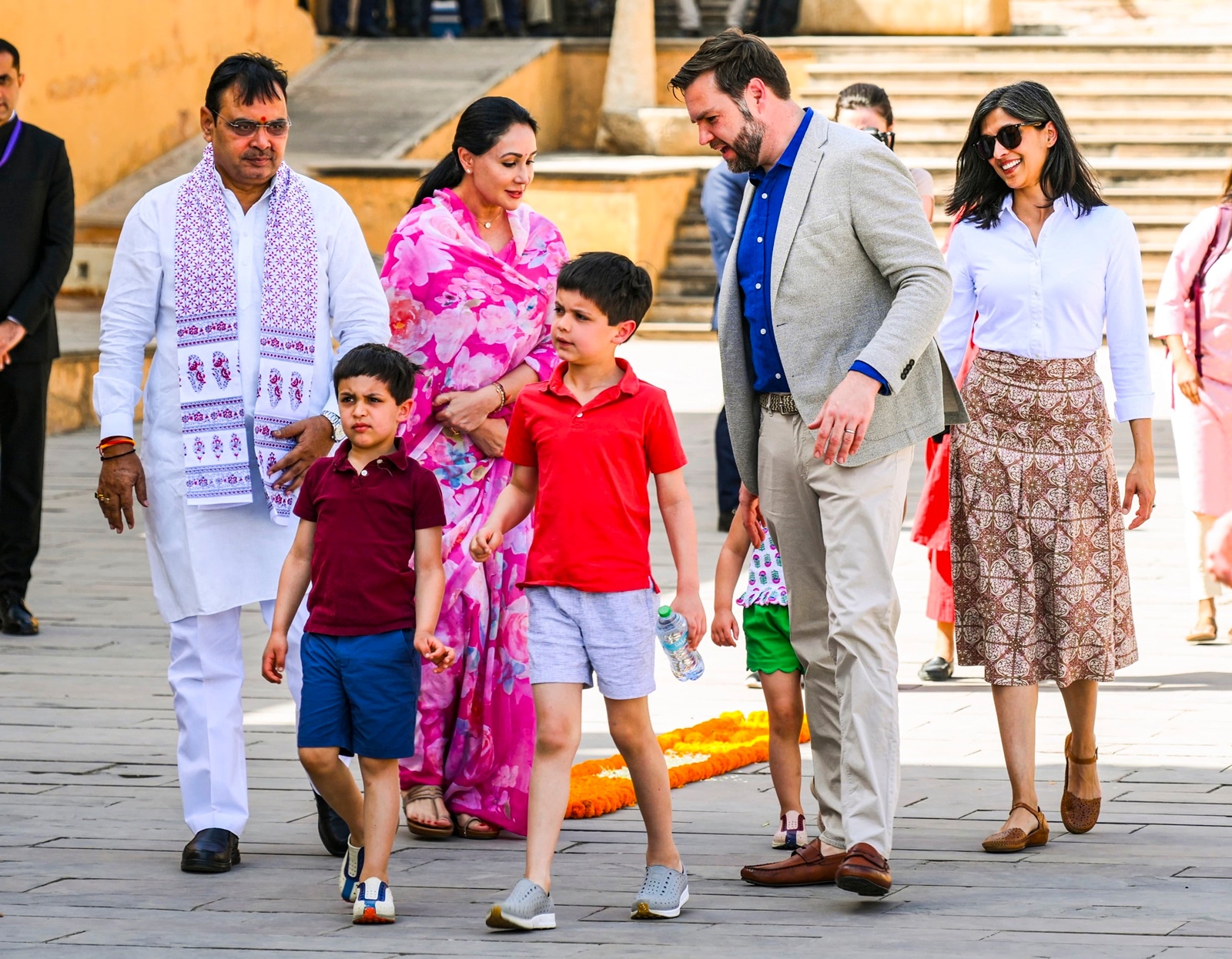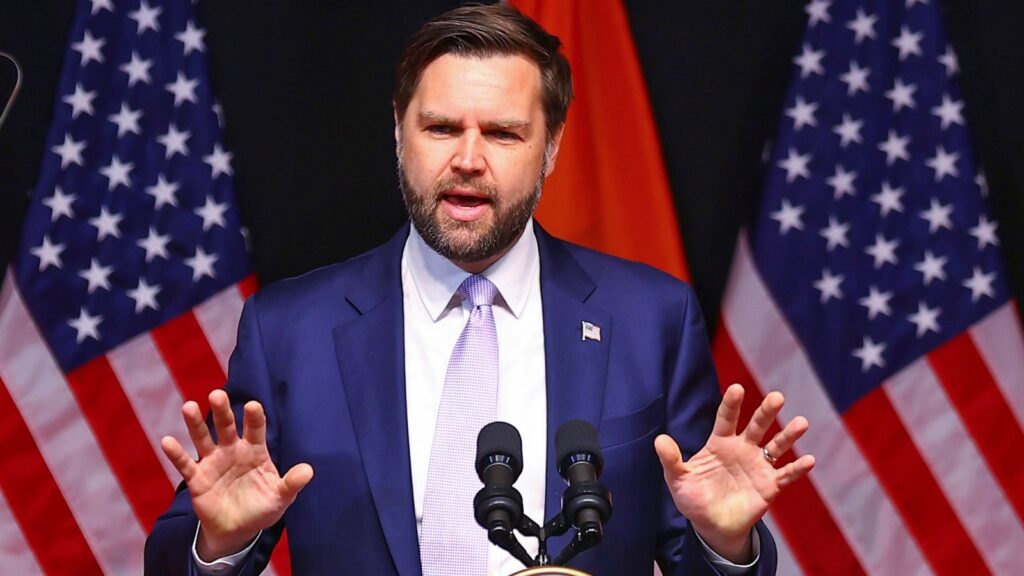In the first broad foreign policy speech on India by the Trump administration, US Vice-President J D Vance on Tuesday pitched for strong bilateral ties and emphasised that US President Donald Trump “wants America to grow…India to grow” and “build the future with our partners all over the globe”.
Speaking at the Rajasthan International Centre in Jaipur, Vance also criticised previous US administrations for approaching India “with an attitude of preachiness, or even one of condescension”.
He went on to outline the contours of his country’s aggressive trade policy, saying that Trump “seeks to rebalance global trade” so it works for the US and its “friends” like India. “I believe President Trump’s efforts, joined, of course, by the whole country of India and Prime Minister Modi, will make the 21st century the best century in human history,” Vance said.
In his 25-minute speech, the US Vice President called on India “to buy more of” US military equipment and expand American energy purchases while offering to help in exploring the country’s “own considerable natural resources”.
Striking a personal note, Vance said that he told Modi that “he’s got approval ratings that would make me jealous”, and that his children too have developed a “rapport” with the Indian Prime Minister.
Referring to the bilateral goal of doubling trade to $500 billion by the end of the decade, Vance spoke about the finalisation of Terms of Reference for trade negotiations, which was announced Monday. “I believe this is a vital step toward realising President Trump’s and Prime Minister Modi’s vision, because it sets a roadmap toward a final deal between our nations. I believe there is much that America and India can accomplish together,” he said.
 US Vice-President JD Vance along with his family visits the Amer Fort in Jaipur. (Photo: PTI)
US Vice-President JD Vance along with his family visits the Amer Fort in Jaipur. (Photo: PTI)
In this context, he referred to Modi as a “tough negotiator” and someone “who drives a hard bargain”, saying that “it’s one of the reasons why we respect him”. The US Vice President also hinted at the challenges ahead, saying, “One suggestion I’d have is maybe consider dropping some of the non-tariff barriers for American access to the Indian market.”
Story continues below this ad
Speaking at length about defence cooperation, Vande said “our nations will co produce many of the munitions and equipment that will be needed to deter foreign aggressors”. “And launching the joint autonomous systems industry alliance will enable America and India to develop the state of the art maritime systems needed for victory,” he said.
In a thinly veiled reference to China’s aggressive behaviour in the Indo-Pacific region, Vance spoke about India hosting the Quad leaders summit this year. “Our interests in a free, open, peaceful and prosperous Indo Pacific are in full alignment. Both of us know that the region must remain safe for many hostile powers to seek to dominate,” he said.
“We want to work together more, and we want your nation to buy more of our military equipment, which, of course, we believe is the best in class, American fifth generation, F 35 for example, give the Indian Air Force, the ability to protect your airspace and protect your people like never before,” he said, reiterating Trump’s offer in February after his meeting with Modi.
Seeking to differentiate the Trump administration from previous US governments, Vande said, “I believe that our nations have much to offer to one another, and that’s why we come to you as partners, looking to strengthen our relationship.”
Story continues below this ad
Specifically referring to the previous US approach towards the NDA government under Modi, Vance said, “We’re not here to preach that you do things any one particular way. Too often in the past, Washington approached Prime Minister Modi with an attitude of preaching this, or even one of condescension. Prior administrations saw India as a source of low cost labour. On the one hand, they criticised the Prime Minister’s government, arguably the most popular in the democratic world, and as I told Prime Minister Modi last night, he’s got approval ratings that would make me jealous.”
Moving on to a broader topic, Vance took on what he said was the “thesis” of the world being flat. “Over time, we’d all assume the same sort of bland, secular, universal values, no matter where you lived, the world was flat. After all, that was the thesis, and that was what they told us. And when that thesis was false, or at least incomplete, leaders in the West took it upon themselves to flatten it by any means necessary. But many of the people across the world, and I think your country, counts among them, they did not want to be flattened. Many were proud of where you came from, their way of life, the kind of jobs they worked, and the kind of jobs their parents worked for them, and that very much includes people in my own country, the United States of America.”
In this context, Vance referred to the “manufacturing economy” and said Trump “will go to extraordinary lengths to protect and expand” opportunities for all Americans.
“Our administration seeks trade partners on the basis of fairness and of shared national interests. We want to build relationships with our foreign partners who respect their workers, who don’t suppress their wages to boost exports, but respect the value of their labour. We want partners that are committed to working with America to build things, not just allowing themselves to become a conduit for shipping others goods. And finally, we want to partner with people and countries who recognize the historic nature of the moment we’re in, of the need to come together and build something truly new, a system of global trade that is balanced, one that is open and one that is stable and fair,” he said.
Story continues below this ad
Moving on energy cooperation, Vance said both India and the US want to build, “and it’s one of the many reasons why I think our nations have so much to gain by strengthening our energy ties”.
“We believe your nation will benefit from American energy exports, and by expanding those exports, you’ll be able to build more, make more and grow more, but at much lower energy costs. We also want to help India explore its own considerable natural resources, including its offshore natural gas reserves and critical mineral supplies. We have the capacity, and we have the desire to help,” he said.
“We welcome the Modi government’s budget announcement to amend India’s civil nuclear liability laws, which currently prevent US producers from exporting small modular reactors and building larger US design reactors in India… We believe that American energy can help realise India’s nuclear power production goals, and this is very important, as well as its AI ambitions,” he said.
On the TRUST initiative for critical tech cooperation, Vance said this was the “cornerstone of the partnership of the future”. “We’ve got great hardware, the leading artificial intelligence hardware in the world. You have one of the most exciting startup technology infrastructures anywhere in the world, there’s a lot to be gained by working together,” he said.
Story continues below this ad
On the personal front, Vance spoke about his visit, along with his wife Usha and their three children, to Amber Palace in Jaipur. “This is my first time visiting the birthplace of my wife’s parents,” Vance said, speaking broadly about the India visit, before quipping, “She’s a bit of a celebrity, it turns out, in India. I think more so than her husband.”
He also said that their children have “only really attached themselves to, they’ve only really liked, really built a rapport with two world leaders”. “The first, of course, is President Trump. He just has a certain energy about him. But with Prime Minister Modi, it’s the exact same thing… Our kids just like him. And I think that because kids are such good, strong characters, I just like Prime Minister Modi too. And I think it’s a great foundation for the future of our relationship,” Vance said.


